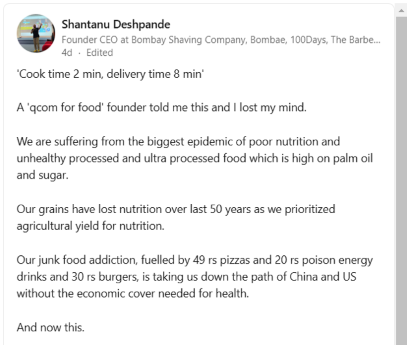Viral Post Sparks Debate on India’s Food Habits
A recent LinkedIn post by Shantanu Deshpande, CEO of Bombay Shaving Company, has ignited a national debate about the growing prevalence of unhealthy dietary habits in India. Deshpande’s viral pos on food habits addressed issues ranging from the rise of ultra-processed foods to the rapid adoption of quick food delivery platforms. His critique sheds light on how evolving food habits and convenience-driven consumption patterns could potentially lead to a public health crisis.

The Epidemic of Processed Foods
In his post, Deshpande labeled the current trend as the “biggest epidemic of poor nutrition,” highlighting how ultra-processed foods, laden with palm oil and sugar, dominate Indian diets. He criticized the long-term agricultural focus on yield over nutrition, which has diminished the quality of grains over decades. He also voiced concerns over the affordability and accessibility of junk food, with items like low-cost pizzas and energy drinks becoming dietary staples for many.
Deshpande drew attention to the role of food delivery platforms, which promise ultra-fast services. He described the cycle of reheated, processed food being delivered in minutes as a compromise on quality. He urged these platforms, including Zomato, Swiggy, and Zepto, to innovate towards delivering fresher, healthier meals while maintaining efficiency.
The post also included a call for regulatory oversight. Deshpande emphasized the need for consumers to make healthier choices, advising individuals to cultivate basic cooking skills. He remarked that cooking is a vital life skill that promotes long-term health and well-being. Deshpande’s conclusion underscored the significance of mindful eating, reminding people that “you are what you eat.”
Reactions
Deshpande’s post received mixed reactions online. While many agreed with his views, others highlighted alternative perspectives. Some commenters expressed concern over the rapid shift toward unhealthy diets, describing it as a significant health hazard. Others noted that responsible innovation in food delivery could address the concerns raised.
Nutritionist Rupali Datta also weighed in, emphasizing the decline in essential life skills such as cooking and grocery shopping among younger generations. She pointed out that reliance on ready-to-eat meals and fast food has led to lifestyle-related disorders, particularly among women, citing the increase in PCOS and PCOD cases as alarming indicators. Datta warned that these dietary habits could have cascading effects on future generations.
A Wake-Up Call
The viral post has sparked conversations about the intersection of convenience, nutrition, and public health. As India grapples with the challenges posed by ultra-processed foods and fast delivery systems, there is a pressing need for a shift towards more mindful eating practices, regulatory vigilance, and public education on the importance of balanced diets.
See Also:
OpenAI Whistleblower, Suchir Balaji, Found Dead in US
How Much Prize Money Did Gukesh Win
86 Indians Killed or Attacked Abroad in 2023
Police Summon Wife of Atul Subhash in Suicide Investigation
——————————————————————————-
It would mean the world to us if you follow us on Twitter, Instagram and Facebook. At Newscazt, we strive to bring you the latest news and stories from India, World, Business, Sports, Entertainment and more. Our team of experienced journalists and writers are committed to delivering accurate and unbiased news and analysis.




